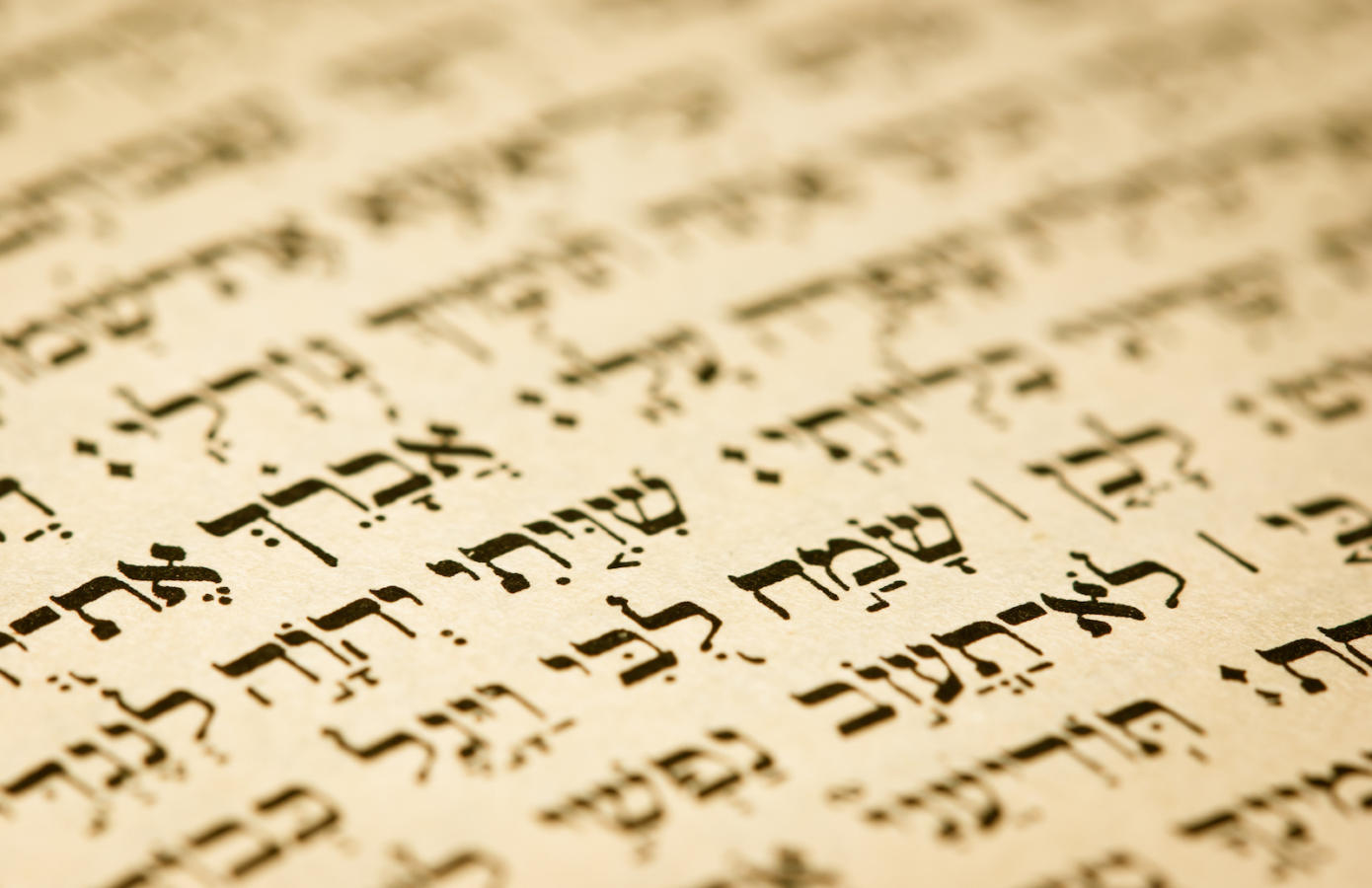Language, especially Hebrew, has a theological significance in Judaism not commonly associated with language in any other religion. Three reasons account for this: (1) the Hebrew scripture’s depiction of the world’s being called into being through divine utterance, suggesting that Hebrew is the very language of creation, (2) the presence in scripture of verbatim quotations of God, again in Hebrew, and (3) the many acts of piety prescribed in scripture and rabbinic documents that require writing out and/or reciting a text, again, usually in Hebrew, sometimes in Aramaic.
Thus, while part of the legacy Judaism inherited from its ancient Near Eastern and Hellenistic antecedents is multilingualism, Hebrew, as the language of creation and revelation has remained central.
This centrality of language continued even as, over a period of centuries, Hebrew ceased to be a spoken language and was supplanted in daily Jewish life by other languages specific to Jews, the most famous and widely spoken of which were Yiddish and Ladino. Like Hebrew, these languages became part and parcel of Jewish religious identity, employed in the study of Torah and in private, and even some public, prayers.
The fact that Judaism is a religion of sacred languages is underscored by the realization that, in the modern period, the abandonment of these languages in favor of the languages of the Jews’ host cultures was symptomatic of secularization over all. This was the case even in the State of Israel, where traditional Jewish languages were abandoned in favor of a new secular language, modern Hebrew.
With your help, My Jewish Learning can provide endless opportunities for learning, connection and discovery.
And yet, the Hebrew of modern Israel has come to provide for probably the greatest number of Jews in history a direct access to the spiritual treasures of the Hebrew scripture and rabbinic literature, as well as a feeling of association with the entire history of the Jews, their religion, and culture. The revival of Hebrew thus is perceived by many as part and parcel of the unfolding drama of God’s messianic redemption, and Hebrew has retained its place not only as a language Jews speak but as a Jewish language, significant in the theology and, most important, eschatology, of Judaism.
Hebrew in Traditional Sources
To understand the significance of language in Judaism, we must begin with scripture and, in particular, the creation narrative. Nine of the acts of creation described in Genesis 1:1‑2:4 are introduced by the words “And God said.” Turning the very first word of the Bible, Bereshit (“in the beginning”), into a divine utterance, Mishnah Avot 5:1 determined that the cosmos came into being as a result of 10 divine utterances. The later exegetical tradition found in this assertion of Mishnah Avot is a restatement of Psalm 33:6, “By the word of the Lord the heavens were made,” or of Psalm 33:9, “He said [a word], and it was [so].”
In Proverbs 8:22, personified wisdom declares that she was created at the very beginning of God’s dominion, even before the watery abyss whose preexistence is taken for granted in Genesis 1:2. Moreover, personified wisdom declares (Proverbs 8:22‑31) that, at the time of the creation of the cosmos, she accompanied God as a confidant. Already in Psalm 119 this personified wisdom of Proverbs is identified with Torah, the same Torah that, in Psalm 119, as already in Deuteronomy 17 and Nehemiah 9, comprises a God‑given book of instructions concerning human behavior.
Simple logic suggests that if wisdom is Torah and wisdom is God’s companion at creation, then it was the Torah that accompanied God at Creation. It is a short step from this logical inference to the idea, first attested in the writings of the first-century C.E. Alexandrian Jewish philosopher Philo, later in Genesis Rabbah 1:1 [ a work of Midrash, biblical interpretation], and still later among medieval kabbalists, that the Torah was the blueprint used by God in creating the cosmos.
It is, further, only a small step from this notion to the conclusion that the language of the Hebrew scripture–and with it, the language of the Mishnah, the liturgy, most of the midrashic literature, and the language in which the rabbis of the two Talmuds express their definitive statements–is also the language of creation. This means, ultimately, that the 22 letters of Hebrew’s alphabet are the alphabet of creation. [Sefer Yetzirah (“The Book of Creation”), a mystical work written around the second century, develops this idea in detail.]
In keeping with this idea, Berachot 55a [of the Babylonian Talmud] informs us that Judah had a tradition from Rab (a late third-century C.E. rabbi) that Bezalel, who was called upon to fashion the vessels of the Tabernacle (Exodus 31:1‑11) and implicitly, therefore, to build the Tabernacle itself, was able to do so because he knew how to combine the letters by which the world was created.
Under kabbalistic influence, this same theory of the power of the Hebrew alphabet comes to suggest even to some adherents of late 20th-century popular Judaism, especially in the State of Israel, that faulty‑worded prayers and faulty‑written mezuzot [door hangings, containing the Shema prayer] and Tefillin [straps and small boxes containing scriptural passages and worn during prayer] can and do directly and adversely affect the health and well‑being of persons and the cosmos.
Megillah 1:9 [of the Jerusalem Talmud] notes that Eleazar and Yohanan–both late third-century C.E. Palestinian Amoraim–disagreed regarding the meaning of Genesis 11:1: “The whole world was of one language and few words.” One of these two rabbis (the Talmud seems neither to remember nor to care which) held that “and few words” means that from the beginning people spoke different languages but understood each other. The other rabbi holds that it means that prior to the confusion of tongues (Genesis 11:7‑9) all people spoke God’s language that is, Hebrew.
An alternative understanding of Genesis 11:1, proposed by Hebrew University Assyriologist Aaron Shaffer and published by William W. Hallo, translates Genesis 11:1, “All the earth was of one speech and corresponding words.” This reading sees in this verse a reference to the bilingualism of ancient Near Eastern civilizations beginning in the third millennium B.C.E. It intimates that the bilingualism of Judaism is part of Judaism’s legacy front the ancient Near East. Regardless of their real connection to Genesis 11:1, both the idea of Hebrew as God’s language and the phenomena of bilingualism and multilingualism are part and parcel of Jewish religious life from biblical times.
Reprinted with the permission of The Continuum International Publishing Group from
The Encyclopedia of Judaism, edited by Jacob Neusner, Alan Avery-Peck, and William Scott Green.
Avot
Pronounced: ah-VOTE, Origin: Hebrew, fathers or parents, usually refering to the biblical Patriarchs.
Mishnah
Pronounced: MISH-nuh, Origin: Hebrew, code of Jewish law compiled in the first centuries of the Common Era. Together with the Gemara, it makes up the Talmud.
Talmud
Pronounced: TALL-mud, Origin: Hebrew, the set of teachings and commentaries on the Torah that form the basis for Jewish law. Comprised of the Mishnah and the Gemara, it contains the opinions of thousands of rabbis from different periods in Jewish history.
Torah
Pronunced: TORE-uh, Origin: Hebrew, the Five Books of Moses.



